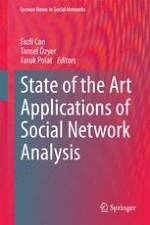2014 | OriginalPaper | Chapter
An Agent-Based Modeling Framework for Social Network Simulation
Author : Enrico Franchi
Published in: State of the Art Applications of Social Network Analysis
Publisher: Springer International Publishing
Activate our intelligent search to find suitable subject content or patents.
Select sections of text to find matching patents with Artificial Intelligence. powered by
Select sections of text to find additional relevant content using AI-assisted search. powered by
